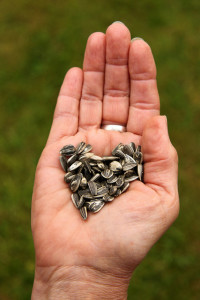A conversation with H Boy went from God being in our heart, to where our heart is, to the idea of a broken heart. He had all kinds of questions about what might break someone’s heart and how it could be put back together.
I thought, someday he’s going to endure a broken heart. And I will want to break the girl’s kneecap.
Our motherly instinct is to protect. We figure out how to teach, guard and stave off the encroaching threats to the tenderness of these little hearts. Even when they’re 16, 25 and 54, they’ll be our little hearts. We want nothing to bruise them.
My friend Patty B, one of those people everyone should meet, signed her email with an old Hasidic saying:
“It is not within our power to place the divine teachings directly in someone else’s heart. All that we can do is place them on the surface of the heart so that when the heart breaks they will drop in.”
We cannot force anything any more than we can protect from everything. Indeed, these are 2 sides of the same coin. Our job is neither to shield nor to shovel but to plant. From birth to 18, it’s all planting season. And as Paul puts it, we can plant and we can water but no one but God can make it grow.

Image via CC – muffinn.
The heart breaking, though excruciating, can be the conduit to greater capacities. It can open the floodgates. A broken heart is an open heart, one able to fully receive love if it has been amply planted and is readily available. Similarly, when unsupported, it could shut down the whole machine.
Seeds of hope, of grace, of mercy. Seeds of love, love, love. Seeds of acceptance, of value, of worth.
This is our best work. Not to raise children who escape life unscathed with love shallowly hidden under the surface, but to make it possible for the right seeds to get planted deeply within the heart as it cracks open.